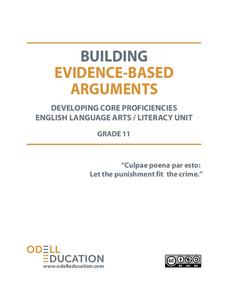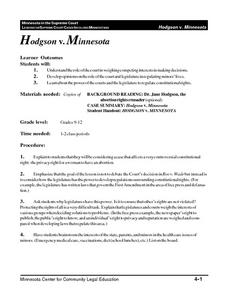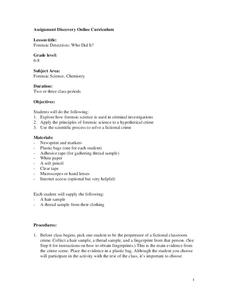ConnectED
Crime Scene Investigation
How exactly does a crime scene investigation work? The resource, a unit on criminology, covers everything from the deductive reasoning skills needed for detectives to DNA fingerprinting, all the way to how to gather evidence and bring...
Curated OER
Science in the Court Room
Share their opinions on the use of DNA databases in criminal investigations. After reading an article, they evaluate the pros and cons of the databases and work in groups to answer discussion questions. They write a letter to a state...
School Improvement in Maryland
Court Proceedings Civil Cases
What's the difference between civil and criminal law? How do the court proceedings differ in these two types of trials? How do the standards of proof differ? Why do these differences exist? As part of their examination of the US court...
Curated OER
Criminal or Hero
Young scholars investigate slavery in America circa the American Revolution. They will examine point- of view and perspective as they research a variety of informational resources. While this is designed to be used with the PBS video...
Odell Education
Building Evidence-Based Arguments: "Cuplae poena par esto: Let the punishment fit the crime."
Should a criminal's punishment match the crime? An argumentative writing plan explores this question as class members investigate a variety of mixed-medium sources by experts in the field, form evidence-based claims, and support them...
Curated OER
DNA Fingerprints
Students study DNA fingerprinting and how it is used in criminal investigations. For this DNA lesson students interpret DNA fingerprints, explore the uses for fingerprinting and see the limitations of DNA testing.
Curated OER
Crime Time
Learners examine fundamentals of American criminal justice by analyzing each step of the criminal process. They follow the process of a well-known or publicized criminal case in The New York Times, and keep a journal of its newspaper...
Curated OER
Crime and Justice
Students investigate what happens when someone is arrested. They engage in a mock trial role play about a burglary. They engage in the process of the Criminal Justice System from arrest to sentencing.
PBS
Using Primary Sources: The Rogue's Gallery
What would be in your life's scrapbook? Scholars use short video clips, primary and secondary documents, and photos to investigate a 1909 scrapbook. They analyze and uncover what the Rogue Book tells them about the past in Western...
Curated OER
Murder Mystery
High schoolers examine how to capture foot prints while they simulate a criminal investigation. They discover how the clues are needed for identifying or eliminating murder suspects.
Curated OER
Riot, Revolution and Reform
Students examine the student protests and subsequent massacre at Tiananmen Square in 1989 and the current petition by victims' family members to open a criminal investigation of the responsible officials.
Curated OER
Writing As Criminal Evidence
Young scholars research 2 famous forgery cases. In this forensics lesson, students are introduced to the methods of handwriting and paper analysis. They then use the Internet to study the cases of the Lindbergh baby and Howard Hughes'...
Curated OER
Biographical Scene Investigators
Sixth graders become members of the BSI in this research simulation. They apply for Biographical Scene Investigator membership, investigate an individual, keep an evidence notebook and write an investigator's report.
Curated OER
Hodgson v. Minnesota
Students investigate the role of and develop opinions of the court in weighing competing interests in making decisions. They examine the power of the courts and legislature to regulate constitutional rights.
Curated OER
The Youth Criminal Justice Act
Students review the Youth Criminal Justice Act and examine the consequences for young people who commit crimes. They investigate the rehabilitation and reintegration processes associated with the act.
Curated OER
Criminal Activities
Students investigate Justice Week in Britain. In this current events lesson, students visit selected websites related to law and order in the U.K. Students may create their own anti-social art as a culminating activity.
Curated OER
the International Criminal Court's History And Uses
Learners analyze and come to explain the history behind the formation of the International Criminal Court, along with the recent controversy facing the Court; and current crises that warrant the Court's attention.
Curated OER
Can I Get A Witness?
Students consider difficulties involved in students testifying in criminal trials. Through first-hand experience in the position of either a witness to a crime or an investigator, students explain how various factors shape a person's...
Curated OER
Who Did It?
Students explore how forensic science is used in criminal investigations. They learn that for the next few days that are going to try to solve a crime that took place in the classroom. Students are given a story to read about the crime...
American Documentary
The Benefits and Drawbacks of Plea Bargains
The outcome of 90 percent of criminal cases in the US is determined by plea bargains. Clips from the documentary Better This World create the backdrop for an investigation of the benefits and drawbacks of the plea bargaining process....
Curated OER
Pressing Cases
Students investigate famous criminal cases in which the media has played a significant role and reflect on how the news helps to shape attitudes and behaviors in their own lives.
Curated OER
Children's Accountability for Their Crimes
Students participate in a round-table discussion about the juvenile justice system and investigate the 'age of accountability' debate. They write a persuasive essay supporting or refuting the punishment received by the children discussed...
Curated OER
Forensic Detectives: Who Did It?
Middle schoolers explore forensic science and its uses in criminal investigations. They solve a fictional crime by identifying and analyzing the fingerprints, strand of hair, and thread samples for evidence. After completing charts for...
Curated OER
Judge and Jury
Learners participate in activities in which they focus on the uses of numbers. For this numerology lesson, students measure distances using standard and non-standard units and record their measurements in various tables. Learners also...

























